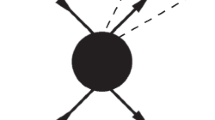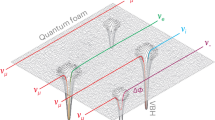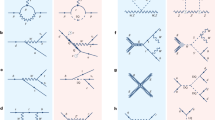Abstract
IT has been pointed out recently1 that the height of the atmospheric layer (100 mb.) in which most mesons are supposed to be produced decreases from the equator towards the poles. The decay of the mesons causes a corresponding increase in cosmic ray intensity.
This is a preview of subscription content, access via your institution
Access options
Subscribe to this journal
Receive 51 print issues and online access
$199.00 per year
only $3.90 per issue
Buy this article
- Purchase on Springer Link
- Instant access to full article PDF
Prices may be subject to local taxes which are calculated during checkout
Similar content being viewed by others
References
Kupferberg, K. M., Phys. Rev., 73, 804 (1948).
Rathgeber, H. D., Naturwiss., 26, 842 (1938).
Kohlhorster, W., and Matthes, I., Phys. Z., 40, 142 (1939).
Compton, A. H., and Turner, R. N., Phys. Rev., 52, 799 (1937).
Gill, P. S., Phys. Rev., 55, 1151 (1939).
Hann-Suring, "Lehrbuch der Meteorologie", 1, 259.
Haurwitz and Austin, "Climatology", 58 (1944).
Rossi, B., Hilberry, N., and Hoag, J. B., Phys. Rev., 57, 461 (1940).
Duperier, A., Terr. Mag. and Atmos. Elec., 49, 1 (1944).
Author information
Authors and Affiliations
Rights and permissions
About this article
Cite this article
RATHGEBER, H. Latitude Effect and Meson Decay. Nature 162, 303–304 (1948). https://doi.org/10.1038/162303b0
Issue Date:
DOI: https://doi.org/10.1038/162303b0
This article is cited by
-
Latitude Effect and Pressure-Level of Meson Formation
Nature (1949)
Comments
By submitting a comment you agree to abide by our Terms and Community Guidelines. If you find something abusive or that does not comply with our terms or guidelines please flag it as inappropriate.



